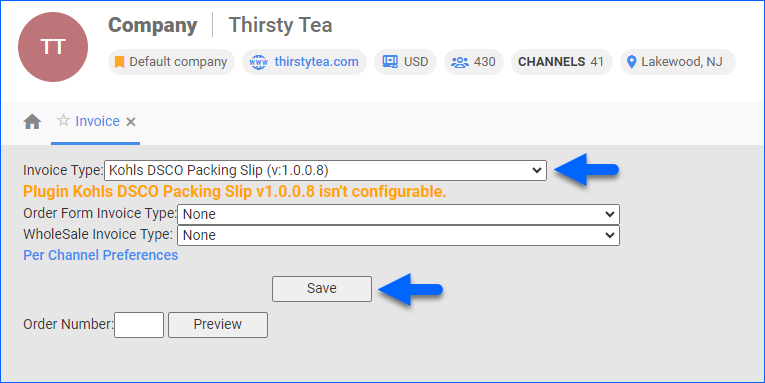Overview
Kohl’s is one of the largest retail chains in the United States, with both physical stores and an online platform. Kohl’s offers a wide range of products, including clothing, shoes, accessories, home goods, and more. The company is known for its competitive prices, discounts, and promotional events.
You can integrate Kohl’s through DSCO, which is a cloud-based platform that enables retailers to manage their orders, inventory, and shipping processes across multiple sales channels from a single location.
Integrating Kohl’s allows you to sell on their platform through Sellercloud. The integration works by transmitting information via API. The following plugins are currently available:
The integration supports the following API plugins:
- DSCO API v3 Inventory Export
- DSCO API v3 Order Import
- DSCO API v3 Tracking Export
- DSCO API v3 Invoice Export
- PDF Invoice Plugin
Prerequisites
You must do the following before you can integrate Kohl’s via DSCO.
DSCO Support
First, contact DSCO Support to request your:
- Supplier ID
- API Token
- Client ID
- Client Secret
- Warehouse Supplier Code
Send an email to [email protected] titled ‘Create Client Credentials.’ In the email, include the name and ID of the DSCO account and the user name with which the client credentials will be associated. When ready, DSCO’s support team will send the client credentials to you. Be sure to store them securely.
To get a Warehouse Supplier code, you must set up a warehouse in DSCO.
- Contact the DSCO Integrations team and log into your DSCO account.
- Click CONNECTING: Step 1 and continue through the onboarding and testing processes. You choose the Warehouse Supplier Code during the onboarding process. You can create it on your Warehouse Manager page in the DSCO portal.
You will use the Client Credentials and Warehouse Codes to populate the Custom Company Settings outlined below.
Custom Company Settings
Create the following Custom Company Settings on the company you created for this integration:
Custom Company Settings for old accounts without Stream API
- DSCO_Token – Enter the Token from DSCO support here.
- DSCO_SupplierId – Your Supplier ID from DSCO support.
Custom Company Settings for new accounts with Stream API
- DSCO_ClientID – Enter your Client ID from DSCO support here.
- DSCO_ClientSecret – Enter your Client Secret from DSCO support here.
- DSCO_StreamID – Leave it empty, it populates automatically for the Stream API.
- DSCO_StreamPosition – Leave it empty. Populates automatically for the Stream API.
As of version 1.0.1.5, the plugin supports both the Stream API and the old method to get orders. The only differences are a few custom settings and credentials. The old method will continue to be used by default, where only DSCO_Token is required, as long as the Stream API settings don’t exist or aren’t populated.
Optional Custom Company Settings
- Consider replenishable products – True or False, defaults to False. When True, enables Replenishable settings for products on Kohl’s.
- Replenishable qty – The quantity that will be exported if the Available Quantity is 0 or less. Only works if the Consider replenishable products setting above is set to True.
- DSCOUseExpectedDeliveryDate – True or False, defaults to False. When True, the value of the custom product column DSCOEXPECTEDDELIVERYDATE will be exported to Kohl’s as the product’s expected delivery date. If this setting is missing or disabled, the exported date will be a week ahead.
- DSCO_WarehouseCode – The DSCO warehouse code that is used by default when the DSCO_WarehouseCodes setting has no value.
- DSCO_WarehouseCodes – A mapping list of Sellercloud WarehouseIDs to DSCO Warehouse Codes. Each pairing is connected by a hyphen (Sellercloud is on the left, and DSCO is on the right) and separated from other pairings by a comma. For example, 123-LakewoodWH, 245-BostonWH.
- DSCO_DontSendItemID – True or False, defaults to False. When set to True, inventory updates will not include ItemID, and DSCO will match the SKU instead.
- DSCOSendCost – True or False, defaults to False. When True, exports the value of the custom product column DSCOCost to Kohl’s.
- DSCO_SendDiscontinued – True or False, defaults to False. When True, it sends the custom column DSCOIsDiscontinued. Products must be discontinued in Sellercloud
- DSCO_SendUPC – True or False, defaults to False. When True, sends UPC with the inventory export.
- DSCO_ExportSsccCode – True or False. If set to True, exports the SSCC code with the tracking.
- DSCO_StandardWarehouseCode – DSCO’s standard Warehouse code exported by the tracking export plugin.
- DSCO_IncludeWarehouseCodeInTracking – True or False. If True, sends the DSCO standard warehouse code from the custom setting DSCO_StandardWarehouseCode.
- DSCO_SendOnePackagePerKitParent – True or False. If True, each kit parent will be in a separate package.
- DSCO_SendKitParentOnly – True or False. If True, only sends the parent SKU with the tracking without the components.
- DSCO_SendShipFromInfo – True or False. If True, sends the orders’ Ship From information with the tracking export.
- DSCO_SendPackageWeight – True or False. If True, sends the package weights with the tracking export.
- DSCO_SendInvoiceDate – True or False, set to True to send Invoice Date.
- DSCO_SendCurrencyCode – True or False, set to True to send the exported order’s Currency Code.
- DSCO_NetTermDays – Numeric only, sends NetTermDays with the invoice export.
- DSCO_NetTermType – Exported when DSCO_NetTermDays exists and isn’t 0.
- DSCO_SendShipToInfo – True or False. If True, sends the orders’ Ship To information with the invoice export.
- DSCO_SendSubtotal – True or False. If True, enables exporting order line subtotal with the invoice export.
- DSCO_SendCreditPerQty – Multiplied by the total quantity and added to the total of the order plus an entry in the credits array in the request.
- DSCO_IntegrationName – Can be set as a Sellercloud channel name. The order source will appear as the set channel name.
- DSCO_MarkOrdersUnpaid – True or False. If True, sets the order as Unpaid.
- DSCO_LockShippingMethod – True or False. If True, does not allow shipping methods on orders to be changed.
- DSCO_IncludeWarehouseCodesInOrderImport – True or False, If True, sets the Ship From warehouse with the order import and checks the setting DSCO_WarehouseCodes for the codes.
- DSCO_ShippingRequiresThirdPartyBilling – If True, the orders’ ShippingRequiresThirdParty will be set to True.
- DSCO_AllowShippingUSPS – True or False. If True, and DSCO_ShippingRequiresThirdPartyBilling is True, and the order’s carrier is USPS, we will NOT set ShippingRequiresThirdParty to True.
- DSCO_AllowShippingUPS – True or False. If True, and DSCO_ShippingRequiresThirdPartyBilling is True, and the order’s carrier is UPS, we will NOT set ShippingRequiresThirdParty to True.
- DSCO_CreatePayments – True or False, defaults to True if missing. Determines if an order payment will be imported or not based on the setting value for the order channel. Defaults to Website, but can be changed with the company setting DSCO_IntegrationName.
- DSCO_CoopFeePercentage – Defaults to 0. The CoOp Fee percentage to be applied when creating order items. 2.5 would denote 2.5% to be added to each order item’s CoOp fee.
Sellercloud Support
Finally, contact Sellercloud Support to request:
- To install the required plugins on your server.
- To add the required Custom Order and Product Columns:
Required Custom Product Columns
- DSCOItemID – Conditionally required String. This should match the SKU of your listing. You can find it on the Products page in DSCO. If left empty for a product, that SKU will be skipped in the inventory update. However, if the custom setting DSCO_DontSendItemID is True, we will send the Sellercloud SKU instead.
- DSCOSafetyQty – Sets a Safety Quantity on the product level.
- DSCOIsDiscontinued – True or False, defaults to False. When set to True, exports the item with a Discontinued status.
Optional Custom Product Columns
- Kohls_Enabled – Optional, True or False. Used to enable only specific products for Kohl’s. Set to True for any products you want to send with the Inventory Export plugin.
- DSCOEXPECTEDDELIVERYDATE – Used when the custom company setting DSCOUseExpectedDeliveryDate is enabled. Exports a date that’s a week ahead when missing or disabled. Sellercloud will follow the entered date. If no date is entered, 7 days from the current date will be sent.
- DSCOCost – Sent when the custom company setting DSCOSendCost is set to True.
- DSCOPartnerSKU – If this column exists and is populated, it is sent as a partner SKU.
Optional Custom Order Columns
- DSCOInvoiceId – The invoice number.
- DSCOConsumerOrderNumber – The imported consumer order number from DSCO is saved here.
- DSCO_Coupons – Imports the coupons here.
- DSCO_Email – Imports the shipping address email.
- DSCO_Channel
Order Import
The Order Import plugin:
- Gets all new orders from Kohl’s via DSCO and imports them to Sellercloud using API.
- Imports orders as paid for the user DSCO_<CompanyID>@sellercloud.com.
- Acknowledges each order after it is created, so it will be moved to Shipment Pending in DSCO and will no longer be included in the new orders download.
- Checks for products by matching:
- DSCO SKU to Sellercloud UPC
- DSCO SKU to Sellercloud Product ID
- DSCO UPC to Sellercloud UPC
- DSCO Item ID to Sellercloud custom column DSCOItemID
- DSCO Partner SKU to Sellercloud Product ID
As of version 1.0.1.5, the plugin supports both the Stream API and the old method to get orders. The only differences are a few custom settings and credentials. The old method will continue to be used by default, where only DSCO_Token is required, as long as the Stream API settings don’t exist or aren’t populated.
If you need to reset the date, use the following DSCO_StreamPosition:
- format: z/yyyy/mm/dd/HH/mm/000
- example: z/2022/09/26/20/19/000
Automate Order Import
To create a scheduled task that regularly imports orders to Sellercloud:
- Navigate to Settings > Scheduled Tasks > Manage Scheduled Tasks.
- Click the green + icon: Create New Scheduled Task.
- Complete as follows:
- Click Task Type and select Import Orders.
- Set the Task Name.
- Select the Company.
- Select the Start Time.
- Click CREATE.
- The following message appears at the bottom of your screen: “Scheduled task created successfully. Click Here to configure the task details.” – click the link.
- Click the Edit button on the top right.
- In the Details section:
- Under Create Orders for Company, select your DSCO company.
- Click the Plugin menu and select DSCO API v3 Order Import.
- In the Import Options section, set Import From to None.
- In the Frequency section, specify the task frequency. For optimal performance, select a range between thirty minutes and one hour.
- In the General section, click the Enable toggle button.
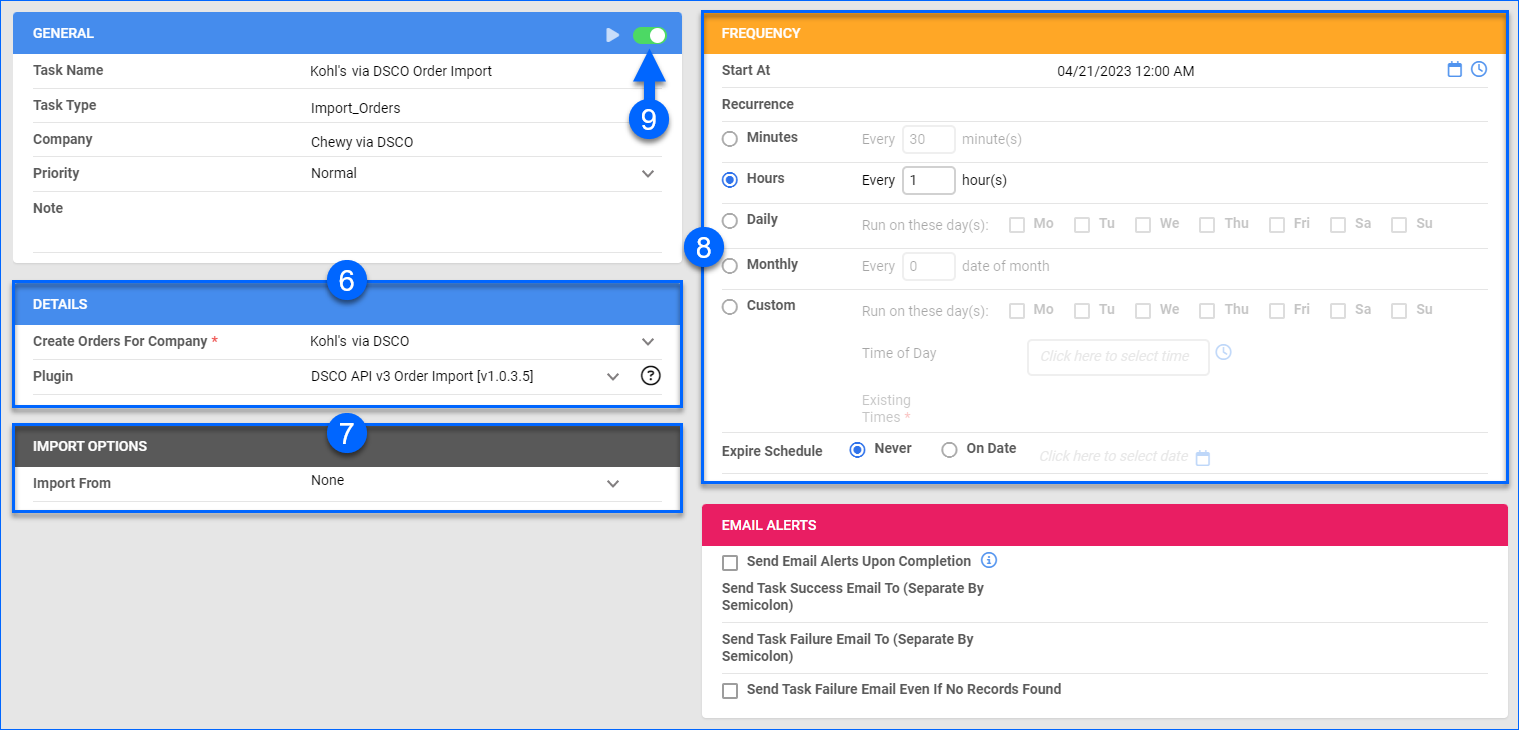
- Click Save on the top right.
Tracking Export
This plugin sends tracking information from Sellercloud to Kohl’s via DSCO.
Before you move on, create a Saved Search for orders filtered by:
- Company – The company you created for the integration
- Order Status – InProcess or Completed
- Payment Status – Charged
- Shipping Status – Fully Shipped
- Tracking Uploaded – No
Automate Tracking Export
To create a Scheduled Task that regularly exports order tracking from Sellercloud to DSCO:
- Navigate to Settings > Scheduled Tasks > Manage Scheduled Tasks.
- Click the green + icon: Create New Scheduled Task.
- Complete as follows:
- Click Task Type and select Export Orders.
- Set the Task Name.
- Select the Company.
- Select the Start Time.
- Click CREATE.
- The following message appears at the bottom of your screen: “Scheduled task created successfully. Click Here to configure the task details.” – click the link.
- Click the Edit button on the top right.
- In the Details section:
- Click the User ID menu and select your ID.
- Click the Saved Search menu and select the saved search you created earlier.
- Click the Export Via menu and select DSCO API v3 Tracking Order Export.
- Check This Is Tracking Export.
- In the Export Options section, set Export To to None.
- In the Frequency section, specify the task frequency. For optimal performance, select a range between thirty minutes and one hour.
- In the General section, click the Enable toggle button.
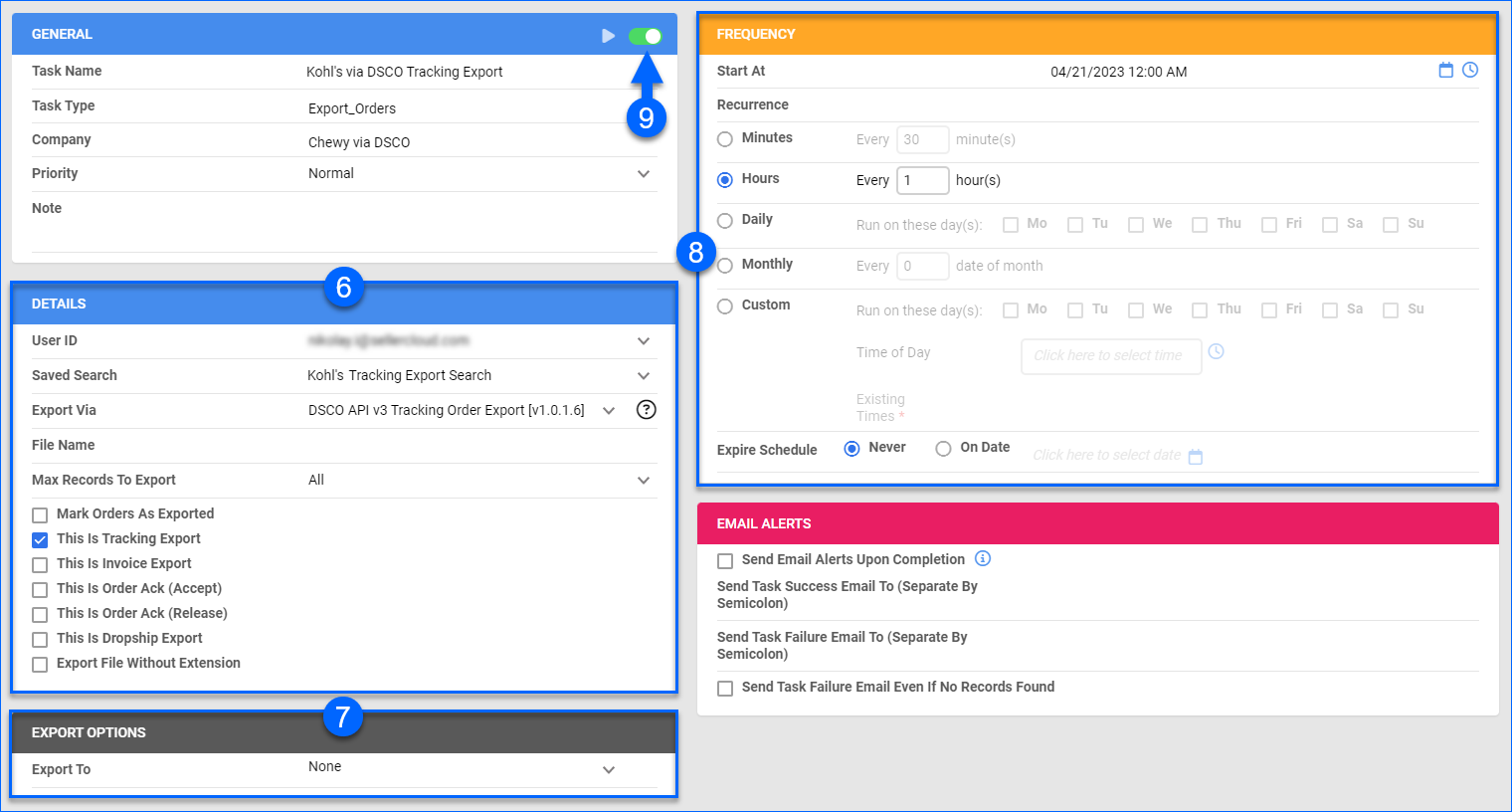
- Click Save on the top right.
Invoice Export
This plugin creates an invoice on Kohl’s via DSCO. It also saves the InvoiceID to the custom column DSCOInvoiceId.
Before you move on, create a Saved Search for orders filtered by:
- Company – The company you created for the integration
- Shipping Status – Fully Shipped
- Order Status – InProcess Or Completed
- Invoice Uploaded – No
- Tracking Uploaded – Yes
Automate Invoice Export
To create a Scheduled Task that regularly exports invoices from Sellercloud to DSCO:
- Navigate to Settings > Scheduled Tasks > Manage Scheduled Tasks.
- Click the green + icon: Create New Scheduled Task.
- Complete as follows:
- Click Task Type and select Export Orders.
- Set the Task Name.
- Select the Company.
- Select the Start Time.
- Click CREATE.
- The following message appears at the bottom of your screen: “Scheduled task created successfully. Click Here to configure the task details.” – click the link.
- Click the Edit button on the top right.
- In the Details section:
- Click the User ID menu and select your ID.
- Click the Saved Search menu and select the saved search you created earlier.
- Click the Export Via menu and select DSCO API v3 Invoice Export.
- Check Mark Orders As Exported.
- Check This Is Invoice Export.
- In the Export Options section, set Export To to None.
- In the Frequency section, specify the task frequency. For optimal performance, select a range between thirty minutes and one hour.
- In the General section, click the Enable toggle button.
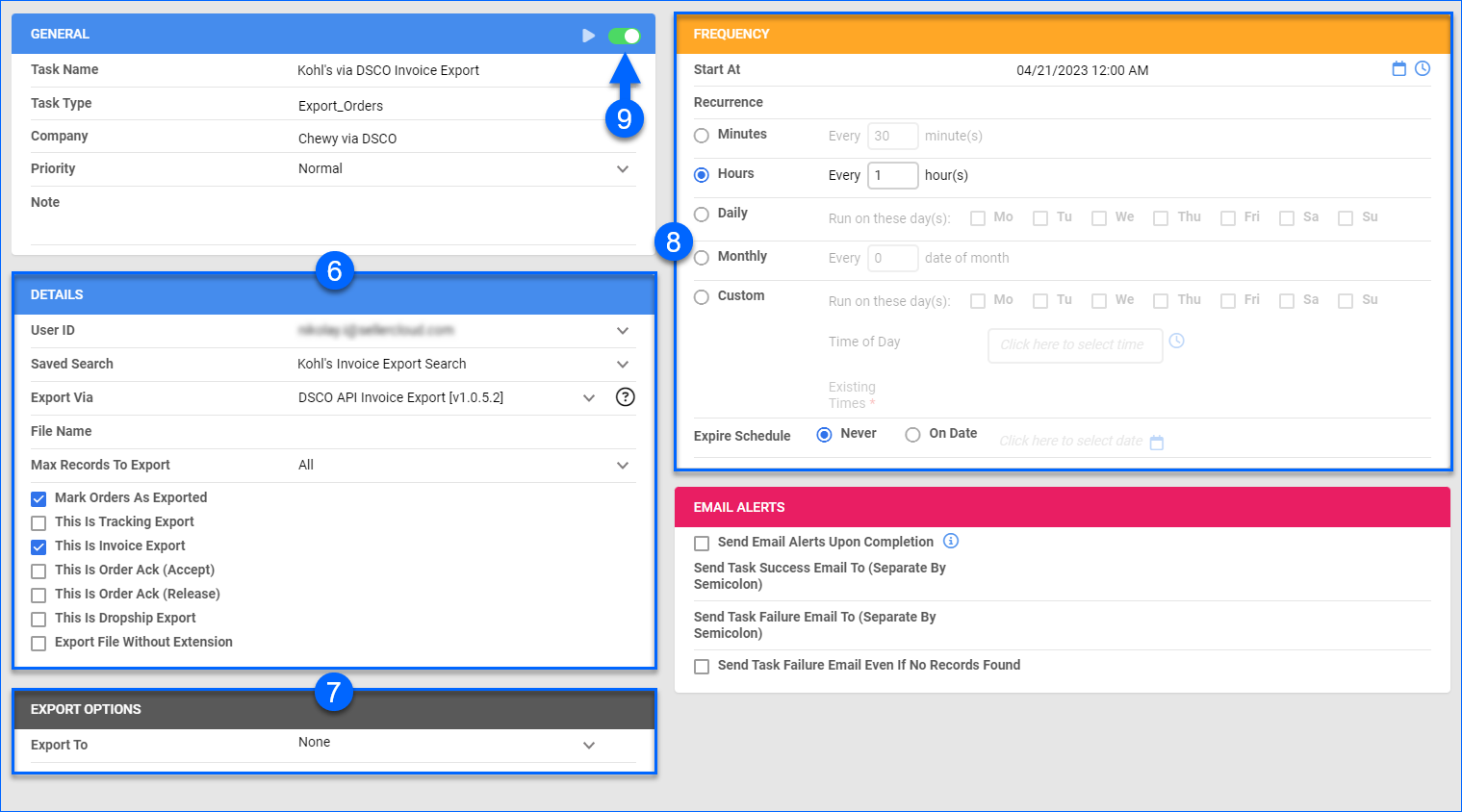
- Click Save on the top right.
Inventory Export
This plugin exports inventory to Kohl’s via DSCO.
- Products must exist in DSCO to be exported.
- You can use the custom product column DSCOSafetyQty to set Safety Quantities.
- DSCOItemID is conditionally required – if empty for a SKU, the SKU will be skipped in the update unless the custom company setting DSCO_DontSendItemID is set to True. The DSCOItemID should match the SKU of your listing found on the DSCO Products page.
Optionally, you can enable only specific products for Kohl’s by setting their Kohls_Enabled Custom Column for Products to True:
- For one product at a time: go to the Product Details Page > click Toolbox and select Custom Columns > click Edit, update the Kohls_Enabled column, and Save.
- For multiple products in bulk: follow the steps to Bulk Update Products and use the Kohls_Enabled column – set it to True for all products you want to enable.
Before you move on, you can create a Saved Search for products filtered by:
- Company – Select the company with products you want to sell on Kohl’s. Without this filter, you will send products from all companies.
- Kohls_Enabled – True. Only add this filter if you choose to enable only specific products for Kohl’s.
Automate Inventory Export
To create a Scheduled Task that regularly exports inventory from Sellercloud to DSCO:
- Navigate to Settings > Scheduled Tasks > Manage Scheduled Tasks.
- Click the green + icon: Create New Scheduled Task.
- Complete as follows:
- Click Task Type and select Export Products.
- Set the Task Name.
- Select the Company.
- Select the Start Time.
- Click CREATE.
- The following message appears at the bottom of your screen: “Scheduled task created successfully. Click Here to configure the task details.” – click the link.
- Click the Edit button on the top right.
- In the Details section:
- Click the User ID menu and select your ID.
- If you chose to only export specific products, click the Saved Search menu and select the saved search you created earlier.
- Click the Export Via menu and select DSCO API v3 Inventory Export.
- In the Export Options section, set Export To to None.
- In the Frequency section, specify the task frequency. For optimal performance, select a range between thirty minutes and one hour.
- In the General section, click the Enable toggle button.
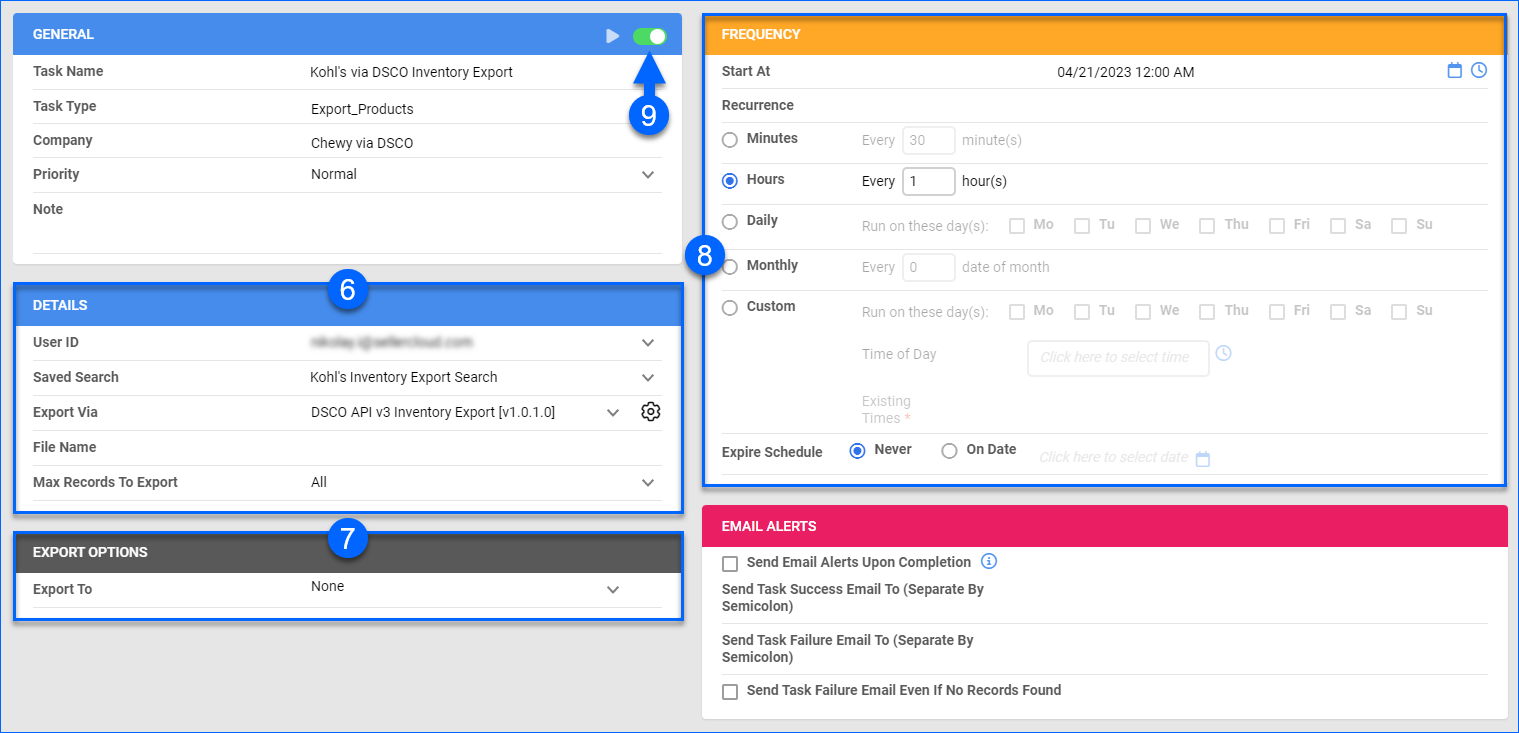
- Click Save on the top right.
Configure PDF Invoices
With the Kohls DSCO Packing Slip plugin set up under your designated company, you can print PDF Invoices with information about your Kohls orders and the products they include through Sellercloud or Shipbridge.
To set up the invoice plugin:
- Go to the Company Settings of the company you created for the integration.
- Click Toolbox and select Invoice Settings.
- Set the Invoice Type to Kohls DSCO Packing Slip.
- Click Save.
